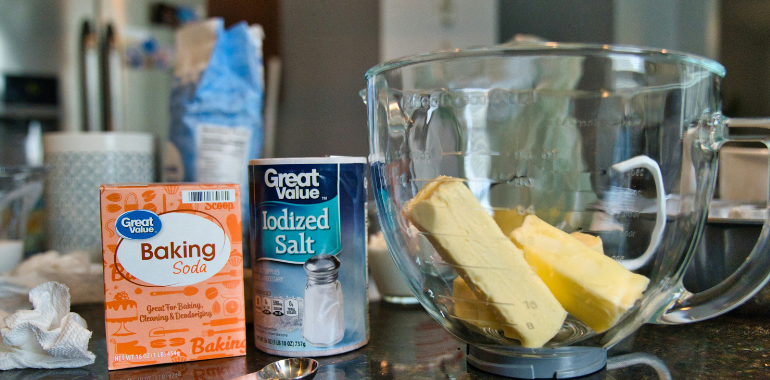Table Of Contents
Baking Soda and Weight Loss – Is There a Connection?
Baking soda sits in most kitchen cupboards as a humble ingredient for cookies or an effective cleaning agent. But could this unassuming powder secretly help with weight loss? This question has sparked curiosity among health enthusiasts looking for natural weight management solutions.
In this article, I’ll examine the science behind baking soda’s potential effects on metabolism, explore safe consumption methods, and analyze whether adding it to your daily routine makes sense for weight management. You’ll discover the truth about this pantry staple and how it might fit into your health journey.
Let’s separate fact from fiction and add some valuable knowledge to your wellness toolkit!
The Dangers of Drinking Baking Soda You Should Know
Baking soda! Also known as sodium bicarbonate, this versatile white powder is a superhero in the culinary world, a trusty sidekick for cleaning tasks, and even a secret weapon against odors. But wait, there’s more! In traditional medicine, including home remedies, baking soda has been hailed for its antacid prowess, taming the fiery beast of stomach acid and offering relief from heartburn, indigestion, and ulcer pain.

Severe side effects:
- ALKALOSIS
The most notorious of these villains is alkalosis, a condition where the body is flooded with bicarbonate ions, causing the body’s pH level to skyrocket. The symptoms? They’re not pretty: muscle twitching, hand tremors, nausea, vomiting, and, in severe cases, even coma.
- HYPERNATREMIA
Another potential hazard lurking in the shadows is hypernatremia, a fancy term for high sodium levels. This can trigger hypertension or swelling due to fluid buildup. If you’re battling kidney disease, heart problems, or high blood pressure, it’s best to give baking soda a wide berth without medical supervision.
- STOMACH TO RUPTURE
Is it safe to drink baking soda? And there’s more! Downing baking soda, particularly after a feast or with alcohol, can cause your stomach to rupture. How? The chemical reaction between baking soda and stomach acid generates gas, leading to bloating (but this is a rare side effect.).
- THROW OFF YOUR BODY’S NATURAL ACID-BASE BALANCE
Overdosing on baking soda can throw off your body’s natural acid-base balance, meddling with the functioning of your muscles, heart, and brain. It can also drain your body’s potassium levels, leaving you weak, tired, and plagued with muscle cramps.
- INTERFERING WITH CERTAIN MEDICATIONS
Asprin, corticosteroids, and memantine, a drug used in the treatment of Alzheimer’s disease interact with baking soda. The pantry staple can also interfere with the absorption and effectiveness of certain drugs like the antibiotic ampicillin, HIV medication, and antifungals which need stomach acid to work.
Also, read – 15 Best Nutrition Apps of Today
What Happens to Your Body When You Consume Baking Soda
When you consume baking soda mixed with water, several physiological reactions occur in your body. First, the sodium bicarbonate reacts with stomach acid to produce carbon dioxide gas (causing those familiar burps) and neutralizes excess acid.
This neutralization process can provide quick relief from heartburn and indigestion by raising the pH level in your stomach. However, this same process can potentially disrupt your digestive system’s natural functioning if used regularly without medical guidance.
Beyond your digestive tract, baking soda enters your bloodstream and can temporarily increase your blood’s alkalinity. This shift in pH might affect how your body processes nutrients and could potentially impact your metabolism, though research specifically connecting this to weight loss remains limited.
For athletes, consuming baking soda before intense exercise may help buffer lactic acid buildup in muscles, potentially delaying fatigue and improving performance. This benefit might indirectly support weight management goals by enhancing workout efficiency.
5 Health Benefits of Drinking Baking Soda Water
While baking soda doesn’t directly lead to weight loss, the drinking baking soda benefits extend to several aspects of health that might indirectly support your weight management journey. Here are the top five benefits:
1. Soothes Indigestion
Baking soda can help soothe stomach acid, reducing heartburn and indigestion. It acts as an antacid, neutralizing the excess stomach acid that causes discomfort.
2. Boosts Kidney Health
Research shows that baking soda solution could help slow the progress of chronic kidney disease by neutralizing the acid in your blood.
3. Enhances Exercise Performance
During intense training, your muscles produce lactic acid, causing fatigue. Baking soda’s alkalinity may delay fatigue, allowing you to exercise at your peak for longer.
4. Improves Oral Health
Baking soda is a popular component in toothpaste and mouthwash. It can kill bacteria, reduce plaque, and prevent tooth decay.
5. Promotes Skin Health
When added to bath water, baking soda can soothe itchy skin and relieve irritations and infections. It’s also used as a natural exfoliant that can leave your skin feeling soft and smooth.
Best Time to Drink Baking Soda for Weight Loss Results
If you’re considering using baking soda as part of your weight management plan, timing matters. The best time to drink baking soda to lose weight is typically on an empty stomach, either first thing in the morning or about two hours after your last meal of the day.
Morning consumption may help jumpstart your digestive system and potentially boost metabolism as you begin your day. The standard dose recommended is 1/2 teaspoon dissolved in a glass of water, consumed on an empty stomach.
Evening consumption, about 1-2 hours before bedtime, might help neutralize acid production during sleep and potentially aid overnight digestion processes. However, avoid taking it immediately after meals, as it can interfere with normal digestion by neutralizing necessary stomach acids.
Important caution: Regardless of timing, never exceed the recommended dosage. Each teaspoon of baking soda contains approximately 1,000 mg of sodium – consuming too much can quickly exceed the American Heart Association’s suggested daily limit of 1,500-2,300 mg.
Lemon and Baking Soda: A Powerful Weight Loss Combination?
Lemons are low in calories and high in vitamin C and fiber. They also contain polyphenols, which have been shown to suppress body weight gain and fat accumulation. Drinking lemon water, especially instead of higher-calorie beverages, could contribute to weight loss.
As mentioned earlier, baking soda doesn’t directly aid in weight loss, but it can potentially improve digestion and workout performance, indirectly aiding in weight loss.
Some dieters suggest that lemon and baking soda create an alkaline environment in the body, which is believed to raise metabolism and promote weight loss. However, this claim lacks solid scientific evidence.
While there’s no harm in drinking lemon water with baking soda (provided you don’t exceed the recommended daily sodium intake), it shouldn’t be seen as a standalone weight loss solution.
The Potential of Baking Soda and Lime for Weight Management
Honestly, this topic is intriguing. While some anecdotal reports suggest potential benefits, it’s important to mention that the scientific evidence directly supporting these claims is still emerging.
Regardless, lime is rich in vitamin C and antioxidants associated with metabolic-boosting properties. The citric acid in lime may help improve digestion, which could indirectly aid weight management by improving nutrient absorption and reducing bloating.
The Science Behind Baking Soda’s Effect on Metabolism
The potential metabolic effects of baking soda center around its alkalizing properties in the body. Some research suggests that creating a more alkaline environment might influence how efficiently your body burns calories and processes nutrients.
One scientific theory proposes that an alkaline state may help optimize enzyme function involved in metabolic processes. These enzymes play crucial roles in breaking down fats and carbohydrates for energy, potentially affecting your metabolic rate and weight management.
Additionally, baking soda’s ability to buffer lactic acid during exercise might allow for longer, more intense workouts. A small study published in the Journal of the International Society of Sports Nutrition found that sodium bicarbonate supplementation before high-intensity training led to improved performance – potentially translating to more calories burned during exercise.
However, it’s important to note that direct research specifically linking baking soda consumption to increased metabolism or weight loss in humans remains limited. Most evidence is either theoretical or based on related physiological mechanisms rather than conclusive clinical trials focused on weight loss outcomes.
Does Baking Soda Actually Help You Lose Weight?
One theory suggests that baking soda can promote feelings of fullness, thereby helping to control appetite and reduce caloric intake.
There are also suggestions that baking soda, when combined with water, apple cider vinegar (ACV), or lemon juice, could potentially assist in weight loss.
The combination of acv and baking soda, in particular, is said to improve blood sugar levels and promote feelings of fullness, which could theoretically contribute to weight loss. However, more research is needed to confirm these effects.
Despite these theories, little to no scientific evidence indicates that baking soda can help you lose body fat.
Also, read – What Can You Eat While & After Fasting?
Baking Soda Weight Loss Recipe – Your Simple Solution
Ingredients
- 1 glass of water (about 250ml)
- 1/2 teaspoon of baking soda
- Freshly squeezed juice from 1/2 lemon
Instruction
Pour the water into a glass. Add the baking soda and stir until it’s completely dissolved. Press the juice from half a lemon into the glass. Stir the mixture well.
Coffee and Baking Soda: A Morning Ritual for Weight Loss?
The combination of coffee and baking soda weight loss claims has gained attention in some health circles. Coffee contains caffeine, which has been linked to increased metabolism and fat oxidation. When paired with baking soda, some believe the effects could be enhanced.
The theory suggests that baking soda might neutralize coffee’s acidity, making it gentler on your digestive system while still allowing you to benefit from caffeine’s metabolic effects. Some users report that this combination provides sustained energy without the jitters or acid reflux sometimes associated with coffee consumption.

However, it’s important to note that no direct scientific evidence supports the idea that adding baking soda to coffee specifically enhances weight loss. The benefits reported are largely anecdotal, and further research is needed to validate these claims.
If you want to try this combination, start with a very small amount—just a pinch (about 1/8 teaspoon) of baking soda added to your regular cup of coffee. This provides enough to potentially reduce acidity without significantly altering the flavor profile or introducing too much sodium into your diet.
How to Safely Consume Baking Soda for Weight Management
1. DOSAGES
There is no established dosage for baking soda for weight loss, as it’s not a recognized use for this substance. Some people start with half a teaspoon mixed in a large glass of water and gradually increase to 1-2 teaspoons.
2. CONSUMPTION METHODS
Baking soda is typically dissolved in water and drunk on an empty stomach. It has a rather unpleasant taste, which you might want to mask with a bit of lemon juice.
However, baking soda and vinegar drinks are not a good idea, as this will neutralize the effect.
3. WATCH BODY’S REACTION
If you start to experience any discomfort, such as bloating, gas, nausea, or increased blood pressure, stop taking baking soda immediately.
4. SAFETY PRECAUTIONS
If you’re on a sodium-restricted diet, have kidney problems, or suffer from chronic health conditions, you should avoid consuming baking soda without first consulting your doctor.
Pregnant or breastfeeding women also need to avoid ingesting baking soda for weight loss.
Comparing Baking Soda with Other Natural Weight Loss Remedies
When evaluating baking soda against other natural weight loss options, several key differences emerge. Unlike proven natural remedies such as green tea or apple cider vinegar, baking soda lacks substantial scientific evidence specifically supporting weight loss claims.
Green tea contains catechins and caffeine that have been extensively studied for their metabolism-boosting and fat-oxidizing properties. Apple cider vinegar has demonstrated modest effects on satiety and blood sugar regulation in multiple clinical trials. By comparison, baking soda’s potential weight loss benefits remain largely theoretical.
Fiber-rich remedies like psyllium husk directly impact digestive health and create fullness, naturally reducing calorie intake. In contrast, baking soda operates through different mechanisms – primarily affecting pH balance rather than directly influencing fat metabolism or appetite control.
Safety profiles also differ significantly. Natural options like cinnamon or turmeric can generally be consumed daily with minimal risk, while baking soda requires more careful dosing due to its high sodium content and potential for disrupting electrolyte balance when used improperly or excessively.
The most effective natural weight management approaches typically combine multiple strategies rather than relying on a single remedy. If you’re considering baking soda, it might be more effective as part of a broader plan that includes proven methods like dietary improvements, regular exercise, and adequate hydration.
Potential Side Effects of Using Baking Soda for Weight Loss
While baking soda might offer some health benefits, using it specifically for weight loss purposes comes with several potential risks that shouldn’t be overlooked. These side effects range from mild discomfort to serious health complications.
Digestive issues are among the most common side effects. The alkaline nature of baking soda can disrupt your stomach’s natural acid balance, potentially causing gas, bloating, and cramping. Some people also experience nausea or diarrhea when consuming baking soda solutions.
More concerning is the high sodium content in baking soda. Regular consumption can lead to increased blood pressure, fluid retention, and electrolyte imbalances. This is particularly dangerous for people with existing heart conditions or kidney problems.
Metabolic alkalosis represents another serious risk, where your blood becomes too alkaline. Symptoms include muscle twitching, irritability, nausea, and in severe cases, muscle spasms or seizures. This condition can develop from consuming too much baking soda, especially on a regular basis.
Long-term use may also interfere with your body’s natural acid production in the stomach, potentially affecting nutrient absorption and digestion efficiency. This could ironically lead to nutritional deficiencies while attempting to improve health.
Who Should Avoid Baking Soda Weight Loss Methods
Certain groups should absolutely avoid using baking soda for weight loss due to heightened risks of adverse effects. I’ve compiled this essential list of individuals who should steer clear of this method:
People with high blood pressure or sodium-sensitive hypertension should avoid baking soda due to its high sodium content. Each teaspoon contains about 1,000mg of sodium, which can worsen hypertension and increase cardiovascular risks.
Those with kidney disease or impaired kidney function should never use baking soda for weight loss. Their kidneys may struggle to process the additional sodium load, potentially accelerating kidney damage or causing dangerous electrolyte imbalances.
Individuals with certain digestive conditions like stomach ulcers, GERD, or irritable bowel syndrome may experience worsened symptoms from baking soda’s alkalizing effects, which can disrupt the stomach’s natural acid balance needed for proper digestion.
Pregnant and breastfeeding women should avoid using baking soda for weight loss, as its effects on fetal development and infants haven’t been adequately studied, and the sodium content could pose risks to both mother and child.
Anyone taking certain medications—including antacids, blood pressure medications, diuretics, or drugs that affect kidney function—should consult a healthcare provider, as baking soda may interact with these medications or compound their effects.
Also, read – 7 Reasons You Need to Drink Apple Cider Vinegar Every Night Before Bed
The Bottom Line: Is Baking Soda Worth Adding to Your Weight Loss Plan?
After examining the evidence and potential benefits of baking soda for weight management, I’ve reached a clear conclusion: baking soda offers limited direct benefits for weight loss and comes with significant risks if used improperly.
While some theoretical mechanisms suggest baking soda might influence metabolism or exercise performance, the scientific evidence specifically supporting its use for weight loss remains thin. The potential benefits don’t clearly outweigh the risks of sodium overload, electrolyte imbalances, and digestive disruption that can occur with regular consumption.
Rather than viewing baking soda as a primary weight loss strategy, consider it a potential occasional supplement that might indirectly support your broader health goals. If you choose to incorporate it, do so cautiously—start with small amounts (no more than ½ teaspoon in water), monitor your body’s response, and discontinue use if you experience any negative effects.
For most people, focusing on proven weight management strategies will yield better, safer results: maintaining a balanced diet rich in whole foods, engaging in regular physical activity, getting adequate sleep, managing stress, and staying properly hydrated. These fundamental approaches offer more reliable and sustainable paths to weight management than baking soda consumption.
If you’re still interested in trying baking soda as part of your health routine, consult with a healthcare provider first—especially if you have any underlying health conditions or take medications that might interact with it. Your health deserves a personalized approach based on sound medical advice rather than trending remedies with uncertain outcomes.
Wendy is a Registered Dietitian with a passion for writing about nutrition, health, and medicine. Her aim is to translate the medical jargon to make information accessible to everyone so that they can make informed decisions about their health.
Education:
BSc. Dietetics (UKZN) (1994 - 1998)
Post-Graduate Diploma: Dietetics (UKZN) (1999)









